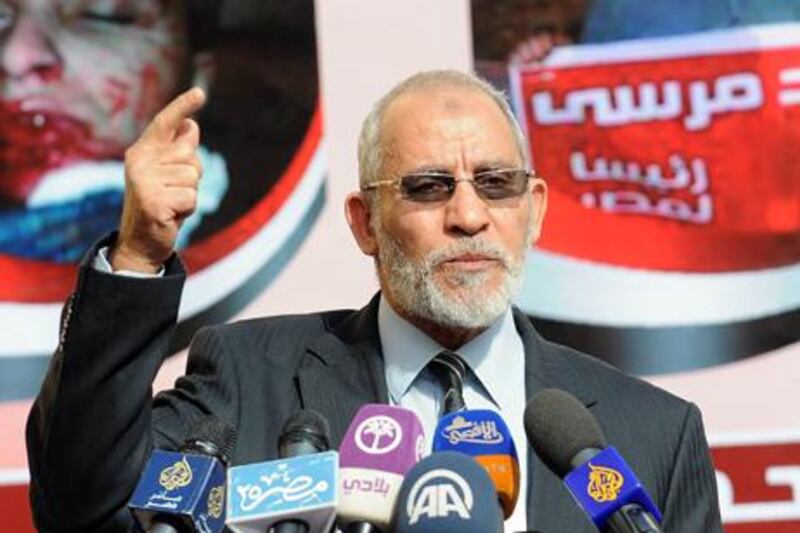CAIRO // Egyptian authorities issued an arrest warrant yesterday for the leader of the Muslim Brotherhood in connection with the deaths of 51 people earlier this week.
The decision was condemned by supporters of Mohammed Morsi, who was removed by the military after days of protests against his year-long presidency.
The Brotherhood's supreme guide Mohammed Badei is among 10 Islamist leaders wanted over the shootings at the Republican Guard headquarters on Monday in which dozens were killed.
State media reported that as the general prosecution investigates the incident, the 10 men, who include the Brotherhood's deputy guide Mahmoud Ezzat and the vice chairman of the its political party, Essam El Erian, were wanted for "planning, inciting and aiding criminal acts".
Two hundred other people were ordered to spend 15 days in jail as the investigation continues, and hundreds more were released on bail.
"Now we are returning to the old regime, especially in terms of national security - which had a very bad reputation in Egypt, because of the times of Hosni Mubarak," said the spokesman of the Brotherhood's Freedom and Justice party, Ahmed Arif, referring to the decades of rule of the former president, under which political Islam was strictly controlled.
The army says that the shootings on Monday began when an armed group tried to break into the Republican Guard building, and that an officer was killed.
The interim prime minister Hazem El Beblawi, meanwhile, held consultations on forming his cabinet. In what is seen as an attempt at reconciliation, Mr El Beblawi has said he will offer the Brotherhood, which helped propel Mr Morsi to the presidency, posts in the transitional government. A Brotherhood spokesman said the group would not take part in an interim cabinet, and that talk of national reconciliation under the current circumstances was "irrelevant".
Mr Morsi's captors have not said where he is being held. He "is not free to go around but he is treated very well," said the interim foreign minister, Mohamed Kamel Amr, in a television interview with CNN on Tuesday. "This is also for his own safety."
The top liberal political group, the National Salvation Front, has also expressed reservations over the reconciliation plan, saying it was not consulted - "in violation of previous promises".
Fifteen Egyptian rights groups condemned nationwide violence, which they attributed both to Islamist groups and the security forces, in a statement published yesterday. They called for security forces to provide protection "to all protesters, including both supporters and opponents of the deposed president".
An impartial investigation is necessary into the recent incidents of violence, which have spiralled since anti-Morsi protests swelled on the June 30 anniversary of his taking office, the groups said.
"At the same time, the undersigned organisations strongly condemn the continuing incitement to violence and killing by the Muslim Brotherhood and its supporters," the statement said.
Further international financial support continued to flood in to support the still-forming new government, which is set to amend the constitution - for the second time in a year - and oversee parliamentary and presidential elections in the course of the next six months.
Kuwait offered aid worth US$4 billion (Dh14.7bn) to Egypt yesterday, according to its state news agency, to "help the people cope with the continuing conditions and their constant repercussions". The aid would consist of $2bn deposited in Egypt's central bank, a $1bn grant and $1bn worth of oil. The money comes after Saudi Arabia and the UAE offered a total of $8bn in aid earlier this week.
In a tense and divided Egypt, political events seemed to overshadow the coming of Ramadan.
Almost as an afterthought in a city already decorated with political logos and revolutionary slogans, people strung up Ramadan lights, and paper stars and moons yesterday alongside new posters demonising the Al Jazeera news channel and glorifying the army.
Silvery streamers glinted in the sunshine over the sit-in at the Rabaa Al Adaweya mosque where thousands of supporters of Mr Morsi have entrenched themselves. Men guarding the entrances read the Quran to sustain themselves in the heat.
Although fears remain of further violence following Monday's deaths, so far the situation has calmed, with Mr Morsi's supporters organising no more demonstrations likely to clash with soldiers or supporters of the military.
However, amid the Ramadan decorations, there was another new feature of the sit-in. A teenaged boy who would not give his name was selling a selection of the clubs, batons and walking sticks which have become an increasingly common sight among the demonstrators, who often insist that they will never carry firearms. He had been selling them for about a week, he said.
"These are not weapons," said Mahmoud Fareed, 56, an unemployed merchant. "They are to protect the women who come to say we want our will." As he spoke, men gathered to examine the sticks, one making a purchase.
"We are defending the truth," he said.
afordham@thenational.ae
* With additional reporting by Associated Press
twitter: For breaking news from the Gulf, the Middle East and around the globe follow The National World. Follow us





